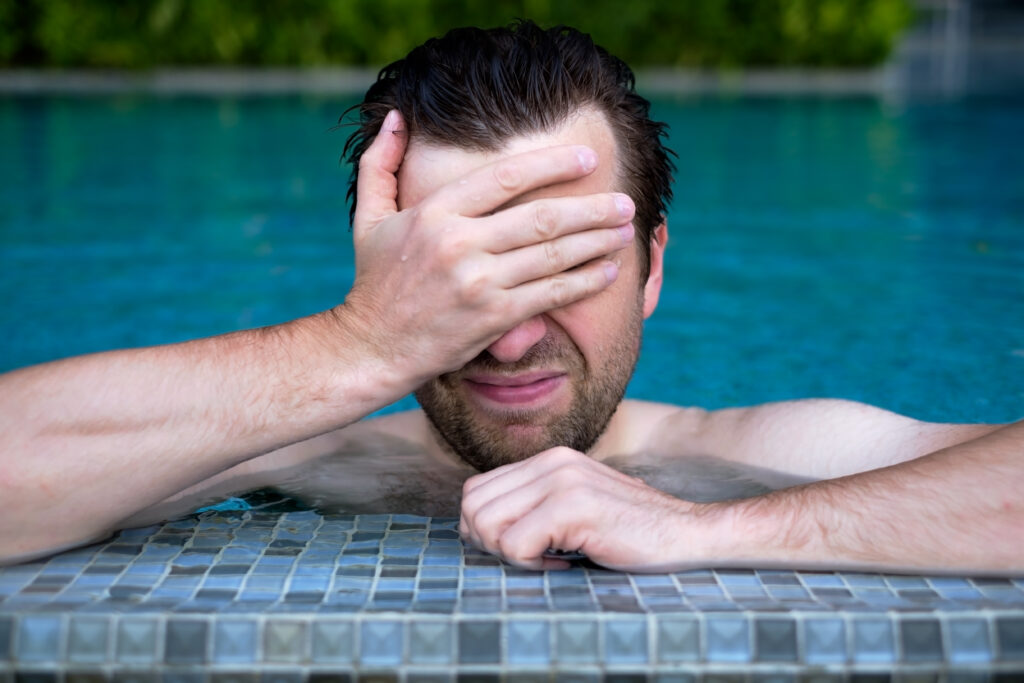Red Eyes After Swimming? It Might Be More Than Just Chlorine

A refreshing swim should leave you feeling energized—not dealing with red, irritated eyes. Yet many people experience eye discomfort after being in the pool, ocean, or lake. It’s easy to assume it’s just the chlorine, and often it is. But recurring redness or blurry vision after swimming could be a sign of something more.
At OptiCare Health, we frequently see patients of all ages who experience eye irritation after water exposure—whether it’s at the gym pool, the beach, or even the backyard. Understanding what’s behind the redness can help you protect your vision and avoid unnecessary discomfort.
Why Swimming Causes Eye Irritation
Chlorine is the most common culprit. It’s used in pools to kill bacteria and maintain safe water conditions. But chlorine also strips away the protective tear film on your eyes. That tear layer helps keep the eyes hydrated and acts as a natural barrier. When it’s washed away, your eyes are left exposed and vulnerable to irritation, stinging, and redness.
Natural water sources—like lakes, rivers, and oceans—pose their own risks. Salt, bacteria, algae, and sand can all enter the eyes, causing similar symptoms. People often underestimate the effects of open water, but those environments can be just as harsh on the eyes as chlorinated pools.
If you wear contact lenses while swimming, your risk increases. Lenses can trap bacteria or debris against the eye, raising the chances of infection or corneal irritation. Even prescription glasses don’t always provide adequate protection from water splashes or UV rays reflected from the surface.
When Red Eyes Aren’t Just a Minor Reaction
In many cases, eye redness fades after a short time. But if it lingers—or happens regularly—there may be an underlying issue that needs attention.
Here are signs that eye irritation after swimming might require a professional evaluation:
-
Redness that lasts into the next day
-
Burning, gritty, or dry sensation
-
Watery discharge or visible crusting
-
Increased light sensitivity
-
Blurry or “foggy” vision that doesn’t clear up quickly
These symptoms could point to an allergic reaction, dry eye, or even conjunctivitis—an eye infection caused by bacteria or viruses. Without treatment, repeated exposure can make the symptoms worse over time.
At OptiCare Health, we offer thorough eye exams that help identify what’s causing your discomfort—and what to do about it.
Smart Ways to Protect Your Eyes While Swimming
You don’t need to give up swimming to avoid eye irritation. A few simple changes can make a big difference in protecting your eye health:
-
Rinse your eyes and face with clean water after swimming
-
Avoid rubbing your eyes, even if they feel itchy
-
Use preservative-free artificial tears to help flush out irritants
-
Wear sunglasses with UV protection to shield eyes from sun and reflection on water surfaces
-
Talk to your eye doctor if you swim regularly—there may be protective strategies tailored to your needs
If you’re frequently in bright or reflective environments—like beaches or poolsides—consider sunglasses with anti-glare coatings and full UV protection. At OptiCare, we’ll help you choose the best lenses and coatings for your outdoor routine.
Don’t Let Red Eyes Ruin Your Summer
Frequent eye irritation after swimming isn’t something you should ignore. Whether it’s from chlorine, saltwater, or bacteria, your eyes need the same care and protection as the rest of your body.
At OptiCare Health, we provide professional care to help swimmers protect their eyes before, during, and after water exposure. Whether you’re a casual beachgoer or daily lap swimmer, we’ll make sure your vision stays clear and comfortable all summer long.
